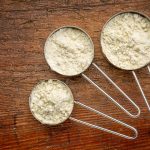//
When it comes to loosing fat, building muscle or getting stronger, making protein a basis of your nutritional intake should be at the top of your list.
People look at me like I’ve lost my mind when I tell them to eat more of something in ways of looking better naked, but protein is that powerful.
While both carbohydrates and fat have spent the past few years being demonized or lauded by turns, no macronutrient has enjoyed the rise to prominence and popularity as protein. While protein currently enjoys the spot as the most awesome of macronutrients, that wasn’t always so. In the early 1900s, diet gurus such as John Harvey Kellogg (yeah, the cereal guy) and Horace Fletcher rallied against the intake of dietary protein due to its “negative effects on digestion and health.” Of course, Kellogg was trying to sell a box of carbohydrates, so take that for what it’s worth.
Protein is used by your body in a number of ways, including repairing damaged muscle, skin, teeth and hair, among other things. Think of it as the mortar between the bricks — without it, the entire structure of your body begins to break down. Protein helps to create an anabolic hormonal environment (good for muscle building and fat loss), and, along the lines of the “brick” metaphor, protein provides a lot of the material used to build your muscles. Eating protein offers a host of other positive effects, including:
Increased thermic effect of feeding — Your body burns calories just to digest, assimilate, transfer and absorb the food you eat. Protein has been said to be almost double that of carbohydrates and fats combined. It’s been shown that the body will burn upwards of 25 percent to 30 percent of protein calories during the digestive process. For example, if you were to ingest a 100 calorie meal of protein alone, the body will burn off 25 to 30 of those calories. This fact alone is one main reason why many people have improved their metabolic rate just by eating more lean protein.
Improved hormone status for fat loss — This is very simplified, but eating protein leads to the release of glucagon, a hormone that helps “release” free fatty acids from fat cells to be oxidized (burned).
Improved body composition — Studies have shown people who eat more protein tend to have more lean body mass and less fat than those who are more focused on carbohydrates in their diet.
Increased satiety — Protein takes a long time for the body to break down, which helps prevent people from overeating during the day.
Read the full article here.
Increase your protein naturally with 180 Superfood.





